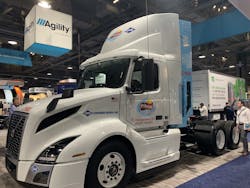A new report found the importance of regional hauls in freight operations is increasing as fleets seek ways to boost driver retention and use more alternative-powered vehicles.
"The growth of regional haul, if it actually occurs, could be a big opportunity for trucking and overall goods movement,” the North American Council on Freight Efficiency (NACFE) said in the report released in late April.
NACFE’s report defined regional as operations in which the truck stays within a 300-mile radius from a home base. The growth in e-commerce and increasing use of automation and other efficiency technologies are also factors in the growing trend.
Regional hauling will require both "rethinking the loading docks and delivery areas at facilities and implementing new approaches to pairing drivers with tractors, but the technology exists today," NACFE said.
This can result in "quality-of-life improvements for drivers” and greater opportunity for electric and alternative-fuel vehicles.
During a workshop at the recent Advanced Clean Transportation (ACT) Expo in Long Beach, CA., an executive with PepsiCo detailed how the company selects specialized transportation solutions for its different units.
While there is “no single silver bullet,” Keshav Sondhi, PepsiCo’s director of fleet engineering and sustainability, said optimizing powertrains and cutting weight are among the top focus areas. For PepsiCo, the beverage side is using more Class 8 tractors while the Frito-Lay snacks division uses more Classes 3-6 vehicles.
The beverage side of the business often bumps up on weight limits and has been using some hybrids for urban deliveries, Sondhi said. With weight not as critical an issue for the Frito-Lay unit, it has increased its use of 30-foot straight trucks, longer than the more traditional 24- or 26-foot versions.
The extended wheel base offers more cubic capacity, and these vehicles are particularly important because no commercial license is required.
Sondhi also said Frito is now using compress natural gas (CNG) power for 50% of its over-the-road miles. At the same time, PepsiCo is in the progress of moving to 100% use of renewable natural gas.
By shifting away from petroleum-based natural gas to natural gas extracted from biowaste, “we might get an offset for cleaning the air while we drive our vehicles,” he said.
Sondhi added the company uses the model of “anchor tenant contracts,” which means fueling stations are installed at the terminals where the CNG tractors are utilized.
He noted that the company earlier in the decade had among the highest count of commercial electric vehicles manufactured by Smith. Those models are nearing the end of their lives, so the company is in the process of evaluating replacements, including the Peterbilt 220EV, Sondhi said.
The electric vehicles are part of a plan to transition a freight facility in Modesto, CA., to near-zero emissions operation. With the aid of a grant as part of the (ZANZEFF project) and is scheduled to be completed in the first quarter of 2021.
The company, which ranks No. 2 on the 2019 Fleet Owner listing of the top 500 private fleets, is attempting to reduce absolute emissions of 20% by 2030.
Meanwhile, later this year NACFE will oversee a “Run on Less” showcase focused on regional haul. It will include 10 participants that will be named later this spring. It is scheduled to take place from Oct. 8-25.
About the Author
Neil Abt
Neil Abt is a former FleetOwner editor who wrote for the publication from 2017 to 2020. He was editorial director from 2018 to 2020.
